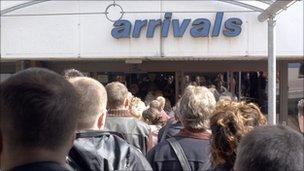Immigration cap 'may not work', MPs warn
- Published

Net migration to the UK stood at 196,000 last year
The government will struggle to achieve its aim of limiting net migration to the UK to "tens of thousands" in five years, MPs have said.
New curbs on international students and those joining family members in the UK may be needed to fulfil the pledge, the Home Affairs Committee said.
And migrants may have to be stripped of the right to settle in the UK to bring numbers down, it added.
The planned cap on workers from outside Europe comes into effect next year.
Net migration - the difference between the number of people coming to live in the UK and the number emigrating - stood at 196,000 last year.
The coalition government has promised to at least halve this by 2015, partly by capping the number of skilled workers from outside the European Economic Area.
'Other routes'
The Home Office introduced a limit for work visas for non-EU citizens in June. A key part of the Conservative election manifesto, this temporary cap of 24,100 will be replaced by permanent measures from April 2011.
But the Commons Home Affairs Committee said this would affect only 1% to 20% of the total number of immigrants and would "make little difference to immigration overall" unless it was set at virtually zero.
And there was a risk that a permanent cap could "hamper businesses, prevent top-class international professionals from coming to the UK and damage the UK's ability to recruit the most distinguished scientists into universities and highly talented individuals into UK companies and public services".
Labour MP Keith Vaz, the committee's chairman, told BBC News the system must be flexible enough to ensure top flight academics, scientists and business people were not barred from coming to Britain.
And he said the government should look at curbing other kinds of migration, such as family reunions and international students, instead of highly skilled workers.
"It can be done, but the government needs to look at other routes in order to achieve it," he said.
"This report hopefully will help the government engage with the problems that would arise. For example you can't have an exemption for footballers and not have an exemption that covers people who might end up as Nobel Laureates, the international scientists that we need."
'Open for business'
Shadow immigration minister Phil Woolas said the report showed the cap was "a pre-election gimmick to con the voters into thinking it would control immigration".
But immigration minister Damian Green said the cap was " just one of the ways we will reduce net immigration to the tens of thousands".
And he said: "Britain will remain open for business and we will continue to attract and retain the brightest and the best people who can make a real difference to our economic growth.
"New research has shown that too many people coming here as highly skilled workers are taking low skilled jobs, and we will need to deal with this."
Business Secretary Vince Cable has repeatedly called for flexibility in how the cap is administered - seen as calling for it to be set as high as possible - following anger from companies that rely on a supply of highly-skilled migrants from countries outside the UK, such as India and the United States.
Ministers have rejected calls to exempt intra-company transfers - a major source of inward migration - from the policy but they insist they are listening to the concerns of business.
On Monday, the Home Office changed the rules so that skilled migrants already working in the UK will have their work permit extended automatically in order to give their employers "greater certainty".
'Major problems'
Explaining the changes, Mr Green said: "We have amended how we will prioritise visa applications to ensure that those migrants that UK business needs most and who will make the greatest economic contribution to the UK are able to work here."
David Frost, director general of the British Chambers of Commerce urged the government to rethink the cap, saying it "must not undermine the ability of UK businesses to recruit the best and the brightest".
Nicola Dandridge, chief executive of Universities UK, which represents the views of vice-chancellors, said the cap will "cause major problems for UK businesses and universities", adding: "World-class research requires world-class people, and we simply can't adopt a 'Fortress Britain' attitude."
There are also concerns the cap will harm scientific research and the NHS, which relies heavily on non-EU migrant doctors and nurses.
Terry John, chairman of the British Medical Association's international committee, said it shared the committee's concerns that the proposed cap "has been rushed through with insufficient attention to how it will work in practice".
But Sir Andrew Green, of the Migration Watch think tank, said that nearly 100,000 work related visas were issued last year, a "significant number compared to net immigration of about 200,000".
"We must, of course, continue to admit key people but economic migration must take a share of the necessary reduction in immigration if our population growth is to be brought under control," he added.
- Published7 October 2010
- Published24 September 2010
- Published17 September 2010
- Published6 September 2010
- Published24 September 2010
- Published23 September 2010
- Published21 September 2010
- Published12 September 2010
- Published7 September 2010